
Call Past Simple Simple Past Tense Of Call Past Participle V1 V2 V3 Images
Past Simple Past Participle Gerund ; call: called: called: calling [kɔːl] [ˈkɒld] [ˈkɒld] [ˈkɔːlɪŋ] [kɔːl] [kɔːld] [kɔːld] [ˈkɔːlɪŋ] Trainer Settings. Break into pronouns . Shuffle cards . Nominal forms . Past Simple Past Participle Gerund. Simple tense . Present Simple Past Simple Future Simple.

Simple Past Tense Transforma
How to form the simple past. For regular verbs, add -ed to the root form of the verb (or just -d if the root form ends in an e ): Play→Played. Type→Typed. Listen→Listened. Push→Pushed. Love→Loved. For irregular verbs, things get more complicated. The simple past tense of some irregular verbs looks exactly like the root form:
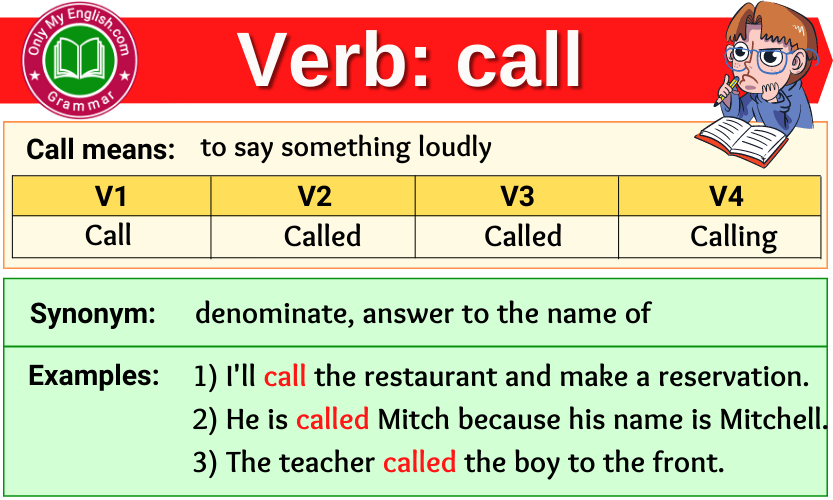
Call Verb Forms Past Tense, Past Participle & V1V2V3 »
Simple Past Tense He/She/It called. I called. You/We/They called. Past Continuous Tense He/She/It was calling. I was calling. You/We/They were calling. Past Perfect Tense He/She/It had called. I had called. You/We/They had called. Past Perfect Continuous Tense He/She/It had been calling. I had been calling. You/We/They had been calling.

Keep your English alive! PAST SIMPLE REGULAR VERBS
call (third-person singular simple present calls, present participle calling, simple past and past participle called or (archaic) call'd) To use one's voice. ( intransitive) To request, summon, or beckon . That person is hurt; call for help! 1684, John Bunyan, The Pilgrim's Progress.
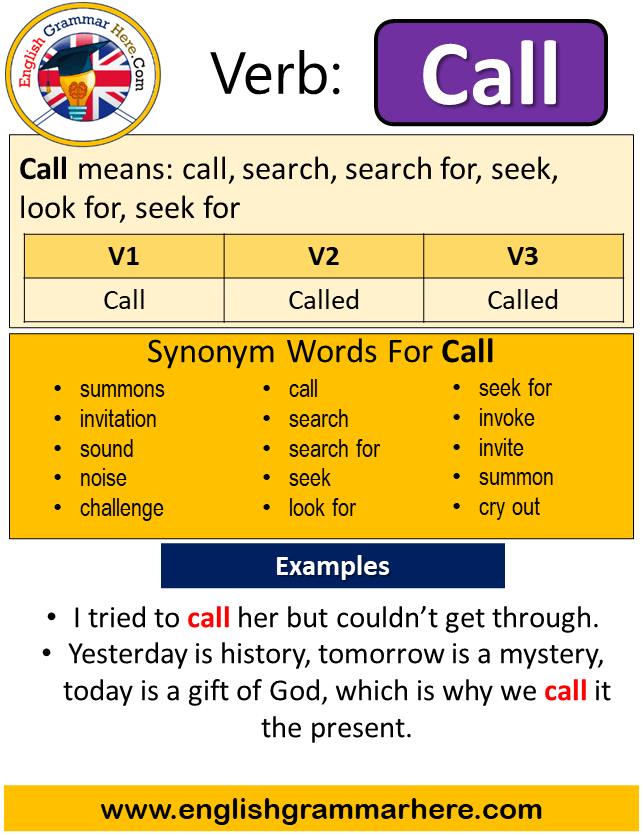
Call Past Simple, Simple Past Tense of Call, Past Participle, V1 V2 V3
Past participle: called Simple past: called Irregular forms Auxilliary verb Spelling change Use contractions Indicative Present I call you call he/she/it calls we call they call you call Preterite I called you called he/she/it called we called they called you called Future I will call you will call he/she/it will call we will call they will call

duvar Guggenheim müzesi Enkaz past simple not be diktatörlük Kutsal
The infinitive of the word form is "call." The present participle form is "calling." The past tense form is "called" and past participle form is "called." Understanding verb tenses. The general grammar rules that govern past tenses are as follows. The simple past tense form is created by adding a -ed or -d affix to the root word.
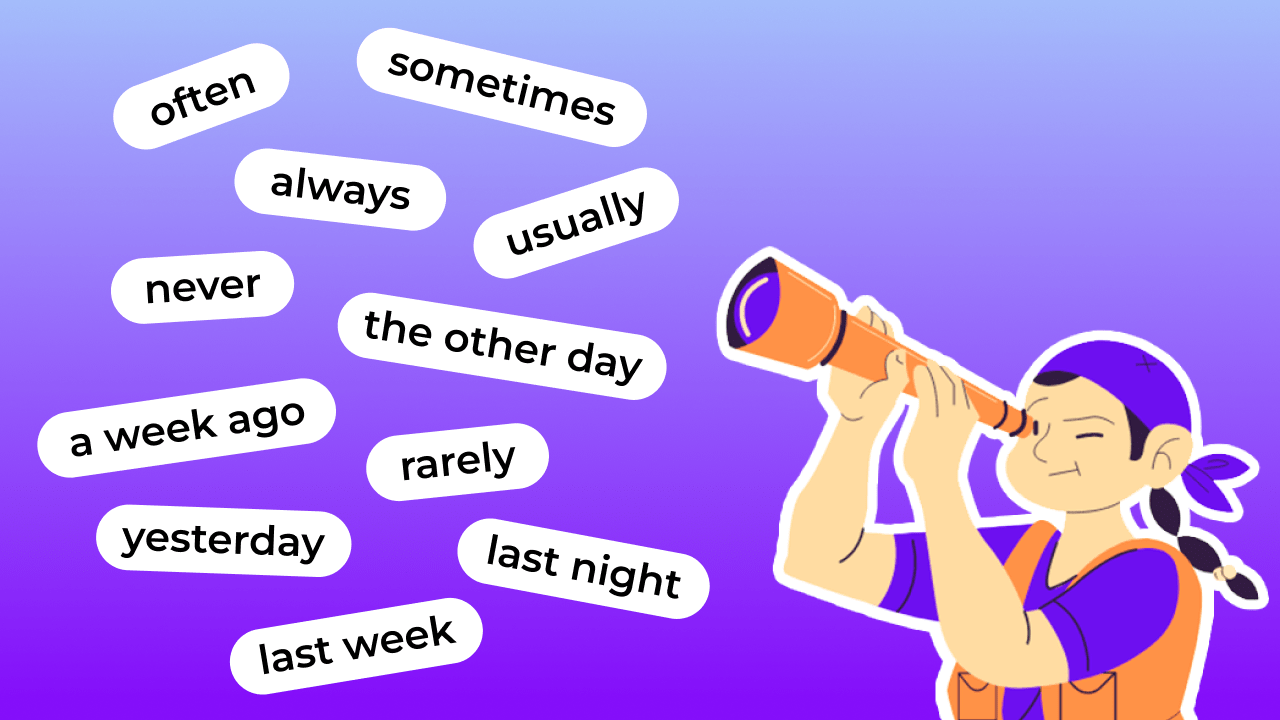
Past Simple правила и примеры употребления, способы образования
past participle: (to) call calling called definition in Spanish in French in Italian Indicative Perfect tenses Continuous (progressive) and emphatic tenses Compound continuous (progressive) tenses Conditional Imperative Subjunctive *Blue letters in conjugations are irregular forms. ( example)

How to Use the Past Simple Tense Improve English Grammar
Call Past Simple, Simple Past Tense of Call, Past Participle, V1 V2 V3 Form Of Call Advertisements When learning English you need to know the meaning of certain words first, and then sort the words appropriately according to grammatical rules.
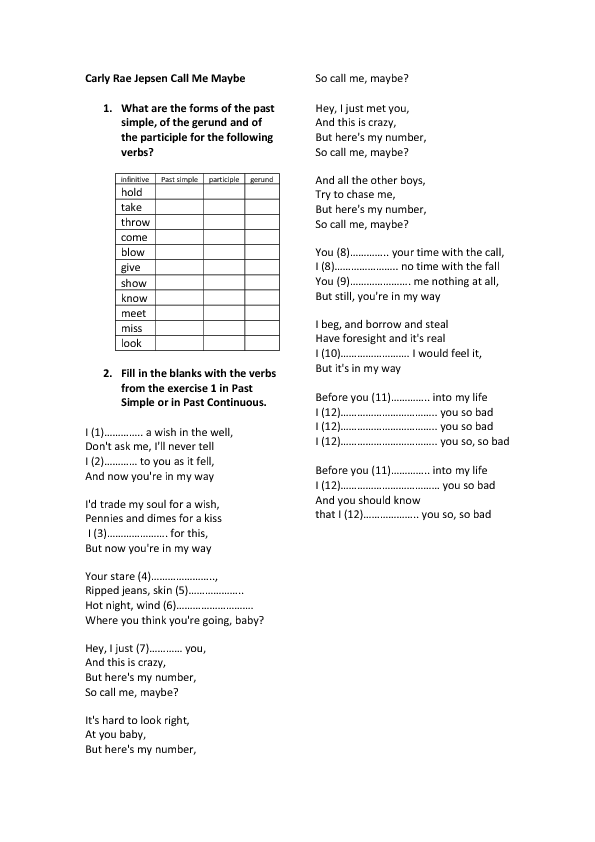
Song Worksheet Call Me Maybe by Carly Rae Jepsen [Past Simple and
Grammar Tenses Past Tense Call - Past Tense, Past Participle, Verb Forms V1 V2 V3 V4 V5 Grammarly Online 10 months ago The word " call " is one of the most commonly used words in the English language, and it can take on a variety of different meanings depending on the context in which it's used.

Call Past Simple форма
Past simple Level: beginner With most verbs, the past tense is formed by adding -ed: called liked wanted worked But there are a lot of irregular past tense forms in English. Here are the most common irregular verbs in English, with their past tense forms: We use the past tense to talk about: something that happened once in the past:
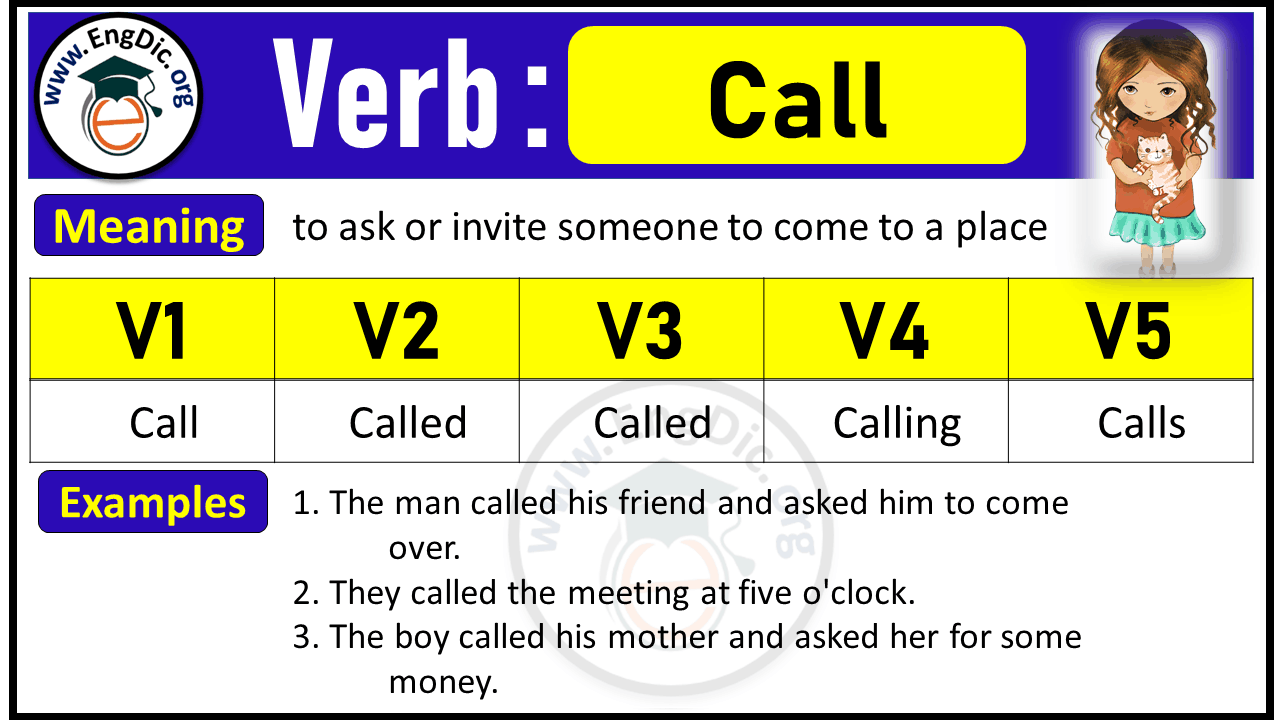
v1 v2 v3 forms of Call Archives EngDic
Call in Past Continuous (Progressive) Tense. Singular. Plural. I was calling. We were calling. You were calling. You were calling. He/She/It was calling.

Calaméo SIMPLE PAST TENSE
The Past Simple (Simple Past) with Other Verbs. We make the past simple just like the present simple except we use 'did' instead of 'do / does'. It's really easy because 'did' doesn't change, even with 'he / she / it'. The positive: We usually make the positive by adding '-ed' to the infinitive. For example, 'play' becomes 'played'.

Thì quá khứ đơn (past simple) Lý thuyết và bài tập có đáp án Blog Hồng
Call V1 V2 V3 V4 V5, Past Simple and Past Participle Form of Call Verb; Call Meaning; invite V1, V2, V3, V4, V5 Form of Call Base Form Past Form Past Participle call called called Base Form s/es/ies ing Form call calls calling Synonym for Call; call, search, search for, seek, look for, seek for When learning English you need to know the meaning of certain words first, and then sort the words.

Call V1 V2 V3 V4 V5 Base Form, Past Simple, Past Participle Form of
Simple tenses Continuous tenses Conditional Imperative Impersonal Simple tenses Present Past Present Perfect Past Perfect Will -Future Going to -Future Future Perfect Return to the dictionary Top of page Found an error? We appreciate your feedback. Click here! Continuous tenses Present Past Present Perfect Past Perfect Will -Future Going to -Future

past simple English ESL worksheets pdf & doc
Wordle Solver Translations for "to call" in our English dictionaries "to call" Spanish translation "to call" Arabic translation "to call" Chinese translation "to call" Czech translation "to call" Danish translation "to call" Dutch translation "to call" Finnish translation "to call" French translation "to call" Georgian translation

Pin on A1 English
Simple Past Tense I called. He/She/It called. You/We/They called. Simple Future Tense I will/shall call. He/She/It will call. You/We/They will/shall call. Present Continuous Tense I am calling. He/She/It is calling. You/We/They are calling. Past Continuous Tense I was calling. He/She/It was calling. You/We/They were calling. Future Continuous Tense